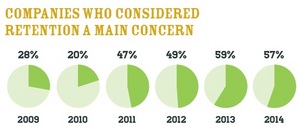SEATTLE, WA--(Marketwired - Feb 11, 2014) - Today, PayScale, Inc. -- the leader in cloud compensation data and software for businesses and individuals -- released the 2014 Compensation Best Practices Report. Based on data from more than 4,700 survey respondents representing human resource practitioners, as well as business line and executive managers, the report reveals attitudes about compensation, hiring and retention as the economy recovers from the recession. The latest annual report shows increasing concern across businesses of all sizes about their ability to retain top performing employees, reflecting an increasingly competitive talent market. Results show that -- regardless of size and industry -- talent retention has become a top priority for business leaders.
While more companies plan to grow in size and offer salary raises in 2014 than in previous years, these businesses also question their ability to attract and retain the right people. Key findings from the 2014 PayScale Compensation Best Practices Report include:
- Companies are optimistic about their business performance in 2014 with 72% expecting their financial situation to improve.
- Retention was listed as a top business concern by nearly 60% of the companies surveyed.
- The skills gap continues to be a concern; half of companies surveyed said they are having a difficult time filling skilled job positions.
- More businesses plan to hire in 2014 than in previous years with 54% of companies stating they have plans to expand in 2014.
- 88% of respondents said their organizations plan to give raises this year.
- A huge need for market-based, real-time salary data exists, as 75% reported some degree of dissatisfaction with the compensation data available.
"The results here suggest that the labor market is finally improving. Retention and appropriate pay levels are therefore going to become hot topics for most all employers," said Peter Cappelli, Professor of Management and Director of the Center for Human Resources at the Wharton School, University of Pennsylvania.
"While many of the economic indicators are encouraging, we also found companies are increasingly worried about retaining their top talent," said PayScale's Vice President of Marketing, Tim Low. "More than ever, real-time, market data on compensation has the ability to give businesses a competitive edge as they grapple with a more dynamic talent economy and employees who are looking for a bigger, better deal."
The report is a summary of survey data collected from business leaders at small, medium and large companies from North America and around the world. The full 2014 PayScale Compensation Best Practices Report is available for download at http://resources.payscale.com/hr-2014-compensation-practices-report.html. For an interactive experience showcasing results from the report, visit www.payscale.com/cbpr
About PayScale:
Creator of the largest database of individual compensation profiles in the world containing more than 40 million salary profiles, PayScale, Inc. provides an immediate and precise snapshot of current market salaries through its online tools and software. PayScale's products are powered by innovative algorithms that dynamically acquire, analyze and aggregate compensation information for millions of individuals in real-time. Publisher of the quarterly PayScale Index™, PayScale's subscription software products for employers include PayScale MarketRate™, PayScale Insight™, and PayScale Insight Expert™. PayScale customers include Cummins, Warby Parker, Zendesk, Clemson University and Covenant Dove. For more information, visit: www.payscale.com or follow PayScale on Twitter: http://twitter.com/payscale.
Contact Information:
Press Contact:
Phyllis McNeice
Firefly Communications
206-954-1481
phyllis@fireflycmns.com
